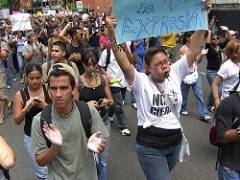To Speak or Not to Speak: The Issue of the Freedom to Free Speech

“Everyone has the right to freedom of opinion and expression; this right includes freedom to hold opinions without interference and to seek, receive and impart information and ideas through any media and regardless of frontiers.” – The Universal Declaration of Human Rights (Article 19), United Nations
As I am writing about freedom, I think it apt to begin by discussing the freedom of speech. I assume most people would agree that writing, talking, singing and the many other forms of expression are key to the progression of the communities in the world. Although some states have strict, and quite frankly terrifying, consequences for certain types of expressive content, today I want to focus on those states that uphold- or say they do- the right to free speech. However, even in states where this freedom is lauded and noted as a core value, it actually isn’t completely free- for good or for worse.
 What is freedom of speech? Some say it’s when you can say anything without legal consequences. But this is not the case; you cannot say something dangerous or threatening and expect the law to be okay with it on the basis of the right to free speech. But, voicing opinions and information is a different scenario, one that does fall under the right to free speech according, to the United Nation’s Universal Declaration of Human Rights (quoted above). If you post something on social media, Facebook for example, that others disagree with or are offended by, most often you will get called out. You are exercising your freedom to express your opinion and ideas. When others comment, they are doing the same thing- so all is fair. However, things become tricky when content severely offends people. For example, when some rhetoric is specifically aimed at groups of people- either races, religions, genders or ethnicities- it can be extremely hurtful and detrimental to those people. We have seen the social and cultural backlash at these offensive comments on social media with the rise of political correctness. Often you see comments on social media such as “you can’t write that” (etc.)— but I want to challenge this notion of political correctness. As someone writing at this very moment, I cannot help but to argue that freedom of speech is vital, especially to having a well informed citizenry.
What is freedom of speech? Some say it’s when you can say anything without legal consequences. But this is not the case; you cannot say something dangerous or threatening and expect the law to be okay with it on the basis of the right to free speech. But, voicing opinions and information is a different scenario, one that does fall under the right to free speech according, to the United Nation’s Universal Declaration of Human Rights (quoted above). If you post something on social media, Facebook for example, that others disagree with or are offended by, most often you will get called out. You are exercising your freedom to express your opinion and ideas. When others comment, they are doing the same thing- so all is fair. However, things become tricky when content severely offends people. For example, when some rhetoric is specifically aimed at groups of people- either races, religions, genders or ethnicities- it can be extremely hurtful and detrimental to those people. We have seen the social and cultural backlash at these offensive comments on social media with the rise of political correctness. Often you see comments on social media such as “you can’t write that” (etc.)— but I want to challenge this notion of political correctness. As someone writing at this very moment, I cannot help but to argue that freedom of speech is vital, especially to having a well informed citizenry.
However, I do sympathize with the political correctness movement. Perhaps instead of addressing the issue of a person’s right to express certain ideas and opinions, the PC movement should focus on if people should express these things. And perhaps instead of attacking those who say something we disagree with, maybe we should as a community try to give them a different perspective, and try to open their eyes to the damage they are causing. I am in no way condoning the racist, sexist, or simply unethical comments made, I agree that they should stop. The harm that offensive commentary can make is extensive and can in some circumstances begin to infringe on peoples’ freedom to choose their cultural practices and in general their right to live without arbitrary interference. However, the detrimental effects of limiting people’s right to speak freely may eventually be worse for the minorities who being verbally attacked.
As seen in Saudi Arabia where freedom of speech is not upheld, Fadhil al-Manasif was convicted in 2014 for his unpatriotic commentary on the protests that occurred in 2011. [i] Al-Manasif disagreed with the generally accepted notions and was sentenced to fifteen years in jail. Additionally, minorities in states without the right to freedom of speech are often the ones convicted more when trying to express their opinion and ideas. Although the “freedom” situation in states like Saudi Arabia are hugely different from those in states that do protect the right to free speech, the same principle can be applied: limiting people’s speech because it goes against what others want to hear is dangerous. We should be constantly weary of both complete and limited freedom. As with most political and controversial discussions, an all-encompassing answer to the issues surrounding what people should and should not be allowed to say is quite unavailable at this moment in time. Yet, I encourage you all to respectfully and thoughtfully exercise your right to express your opinions, most especially when you believe another to be abusing this right. But remember, stay free, folks.
[i] “World Report 2015: Saudi Arabia.” Human Rights Watch. N.p., 29 Jan. 2015. Web.
